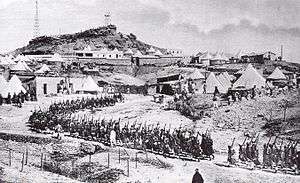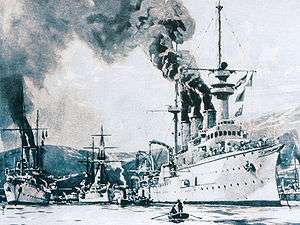Agadir Crisis
The Agadir Crisis, Agadir Incident or Second Moroccan Crisis (also known as the Panthersprung in German) was a brief international crisis sparked by the deployment of a substantial force of French troops in the interior of Morocco in April 1911. Germany did not object to France's expansion but wanted territorial compensation for itself. Berlin threatened warfare, sent a gunboat, and stirred up angry German nationalists. Negotiations between Berlin and Paris resolved the crisis: France took over Morocco as a protectorate in exchange for territorial concessions to Germany from the French Congo, while Spain was satisfied with a change in its boundary with Morocco. The British cabinet, however, was alarmed at Germany's aggressiveness toward France. David Lloyd George made a dramatic "Mansion House" speech that denounced the German move as an intolerable humiliation. There was talk of war, and Germany backed down. Relations between Berlin and London remained sour.[1]
| Agadir Crisis | |||||||
|---|---|---|---|---|---|---|---|
| Part of Causes of World War I | |||||||
 A column of French Army troops on the move in a tented encampment in Morocco, 30 March 1912. | |||||||
| |||||||
| Belligerents | |||||||
| Commanders and leaders | |||||||
|
Sir Edward Grey David Lloyd George | Alfred von Kiderlen-Waechter | ||||||
| Events leading to World War I | ||||||||||||||||||||||||||||||||
|---|---|---|---|---|---|---|---|---|---|---|---|---|---|---|---|---|---|---|---|---|---|---|---|---|---|---|---|---|---|---|---|---|
 | ||||||||||||||||||||||||||||||||
|
||||||||||||||||||||||||||||||||
Background
France's pre-eminence in Morocco had been upheld by the 1906 Algeciras Conference, following the First Moroccan Crisis of 1905–06. In 1911 they forced the sultan to sign a new treaty, where he promised not to sign any treaties without French approval.[2] Thereby violating the earlier made agreements.
Anglo-German tensions were high at this time, partly due to an arms race between Imperial Germany and Great Britain, including German efforts to build a fleet two thirds the size of Britain's. Germany's move was aimed at testing the relationship between Britain and France, and possibly intimidating Britain into an alliance with Germany.[3] Germany was also enforcing compensation claims for acceptance of effective French control of Morocco.
Events
Moroccan Rebellion
In 1911, a rebellion broke out in Morocco against the Sultan, Abdelhafid. By early April, the Sultan was besieged in his palace in Fez. The French prepared to send troops to help put down the rebellion, under the pretext of protecting European lives and property, dispatching a flying column at the end of April. On 8 June, the Spanish army occupied Larache, and three days later Alcazarquivir.
German naval intervention
On the twentieth of june, France agreed to start negotiations. After ten days, they still had not responded. It was then that Kiderlen-Wächter asked the kaiser for permission to send a gunboat.[4] On 1 July, the German gunboat SMS Panther arrived at the port of Agadir, under the pretext of protecting German trade interests. The larger Bremen-class cruiser SMS Berlin came days later, replacing the gunboat.[5] A German civilian, Hermann Wilberg, 110 kilometres (70 mi) to the north, journeyed south to be rescued only to arrive three days after Panther.[6] There was an immediate reaction from the French and the British.
British involvement
The British government attempted to restrain France from adopting hasty measures and to dissuade her from sending troops to Fez but failed. In April, the Foreign Secretary Sir Edward Grey wrote: "what the French contemplate doing is not wise, but we cannot under our agreement interfere".[7] He felt that his hands were tied and that he had to support France.
The British became worried by Panther's arrival in Morocco. The Royal Navy had a naval base in Gibraltar, south of Spain. They believed the Germans meant to turn Agadir into a naval base on the Atlantic.[8] Britain sent battleships to Morocco, in case war broke out. As in the First Moroccan Crisis, British support of France showed the strength of the Entente Cordiale.
German financial crisis
In the midst of this crisis, Germany was hit by financial turmoil. The stock market plunged by 30 percent in a single day,[9] the public started cashing in currency notes for gold, and there was a run on the banks. The Reichsbank lost a fifth of its gold reserves in one month. It was rumored that the French finance minister had orchestrated this crisis.[9] Faced with the possibility of being driven off the gold standard, the Kaiser backed down and let the French take over most of Morocco.
Negotiations
On 7 July, the German ambassador in Paris informed the French government that Germany had no territorial aspirations in Morocco, and would negotiate for a French protectorate on the basis of "compensation" for Germany in the French Congo region and the safeguarding of her economic interests in Morocco. The German terms, as presented on 15 July, while containing an offer to cede the northern part of Kamerun and Togoland, demanded from France the whole of the French Congo from the Sangha River to the sea, to which was later added the transfer of France's right to the preemption of the Belgian Congo.
On 21 July, David Lloyd George delivered a speech at the Mansion House, London in which he declared that national honour was more precious than peace: "If Britain is treated badly where her interests are vitally affected, as if she is of no account in the cabinet of nations, then I say emphatically that peace at that price would be a humiliation intolerable for a great country like ours to endure." The speech was interpreted by Germany as a warning that she could not impose an unreasonable settlement on France.[10]
On 4 November, Franco-German negotiations led to a convention referred to as the Franco-German Accord,[11] under which Germany accepted France's position in Morocco in return for territory in the French Equatorial African colony of Middle Congo (now the Republic of the Congo). This 275,000 km2 (106,000 sq mi) territory, known as Neukamerun, became part of the German colony of Kamerun. The area is partly marshland (where sleeping sickness was widespread) but gave Germany an outlet on the Congo River. Germany ceded to France a small area of territory to the southeast of Fort Lamy (now part of Chad).
Aftermath
American historian Raymond James Sontag argues that it was a comedy of errors that became a tragic prelude to the first World War:
- The crisis seems comic--its obscure origin, the questions at stake, the conduct of the actors--had comic. The results were tragic. Tension between France and Germany and between Germany and England I've been increased; the armaments race receive new impetus; the conviction that an early war was inevitable spread through the governing class of Europe.[12]
With Abd al-Hafid's capitulation and signing of the Treaty of Fes (30 March 1912), France established a full protectorate over Morocco, ending what remained of that country's formal independence. Rather than scaring Britain into turning towards Germany, increased fear and hostility drew Britain closer to France. British backing of France during the crisis reinforced the Entente between the two countries (and with Russia as well), increasing Anglo-German estrangement, deepening the divisions which would culminate in the First World War. [13]
This incident led Britain's Home Secretary Winston Churchill to conclude the Royal Navy must convert its power source from coal to oil, to preserve its supremacy. Until then, the locally abundant coal was favoured over imported oil (mostly from Persia), but the speed and efficiency offered by oil convinced him that "Mastery itself was the prize of the venture." Subsequently, Churchill was asked by Prime Minister H. H. Asquith to become First Lord of the Admiralty, which he accepted.[14]
The crisis led Britain and France to conclude a naval agreement by which the Royal Navy promised to protect the northern coast of France from German attack, while France concentrated her fleet in the western Mediterranean and agreed to defend British interests there. France was thus able to guard her communications with her North African colonies, and Britain to concentrate more force in home waters to oppose the German High Seas Fleet.[15]
German philosopher and world historian Oswald Spengler was inspired by the episode to write his The Decline of the West. "The Agadir crisis of 1911, which suddenly raised the specter of a general European war and strikingly revealed the danger of Germany's encirclement by the Entente, crystallized Spengler's nascent vision of the future international political transformation of the West." [16]
References
- Christopher Clark, The Sleepwalkers: How Europe Went to War in 1914 (2012) pp 204-13.
- GP XXIX, number 140, Affaires du Maroc VI, 332 ff
- Kissinger, Henry (4 April 1995). Diplomacy. Simon & Schuster. p. 912. ISBN 0-671-51099-1.
- Affaires du Maroc VI, 372 ff
- MacMillan, Margaret. The War that Ended Peace: The Road to 1914. Random House, 2013. p. 439.
- MacMillan, Margaret. The War that Ended Peace: The Road to 1914. Random House, 2013. p. 440.
- Quoted in M.L. Dockrill, British Policy During the Agadir Crisis of 1911 from F.H. Hinsley, British Foreign Policy Under Sir Edward Grey (Cambridge, 1977), p.271.
- "Two War Clouds Menace Europe" (PDF). The New York Times. 6 July 1911. Retrieved 27 November 2007.
- Ahamed, Liaquat (2010). Lords of Finance. London: Windmill Books. p. 43. ISBN 978-0-09-949308-2.
- Keith Wilson, "The Agadir Crisis, the Mansion House Speech, and the Double-Edgedness of Agreements." Historical Journal 15#3 (1972): 513-532.
- Maurice, Zimmermann (1912). "L'accord franco-allemand du 4 novembre 1911 au sujet du Maroc et du Congo". Annales de géographie (in French). 21 (116).
- Raymond James Sontag, ‘’European Diplomatic History 1871 - 1930’’ (1933) p. 160,
- Geoffrey Barraclough, From Agadir to Armageddon: anatomy of a crisis (Weidenfeld & Nicolson, 1982).
- Yergin, Daniel (1 January 1993). The Prize : The Epic Quest for Oil, Money & Power. Free Press. p. 928. ISBN 0-671-79932-0.p.11-12, p153-154
- Keith A. Hamilton, "The ‘Wild Talk’ of Joseph Cailiaux: A Sequel to the Agadir Crisis." International History Review 9.2 (1987): 195-226.
- John Farrenkopf, Prophet of Decline: Spengler on World History and Politics (2001) p 12.
Further reading
- Anderson, Frank Maloy and Amos Shartle Hershey, eds. Handbook for the Diplomatic History of Europe, Asia, and Africa 1870-1914 (1918) online, brief summary
- Barlow, Ima Christina. The Agadir Crisis (University of North Carolina Press, 1940).
- Barraclough, Geoffrey. From Agadir to Armageddon: anatomy of a crisis (1982).
- Colonialism: An International Social, Cultural, and Political Encyclopedia. ABC-CLIO. 2003. p. 8. ISBN 9781576073353.
- Brandenburg, Erich. (1927) From Bismarck to the World War: A History of German Foreign Policy 1870-1914 (1927) online.
- Carroll, E. Malcolm, French Public Opinion and Foreign Affairs 1870-1914 (1931). online pp 231–51.
- Carroll, E. Malcolm. Germany and the great powers, 1866-1914: A study in public opinion and foreign policy (1938) online; online at Questia also online review, pp 643–99
- Clark, Christopher. Sleepwalkers: How Europe Went to War in 1914 (2012), pp 204–14.
- Gooch, G.P. History of modern Europe, 1878-1919 (2nd ed. 1956) pp 386–413. online, diplomatic history
- Nicolson, Harold. King George V (1953) pp 177–193. online
- Somervell, D.C. The Reign of King George V, (1936) pp 229–38.online free
- Spender, J.A. Fifty years of Europe: a study in pre-war documents (1933) pp 329–40.
- Wilson, Keith. "The Agadir Crisis, the Mansion House Speech, and the Double-Edgedness of Agreements." Historical Journal 15#3 (1972): 513-532.